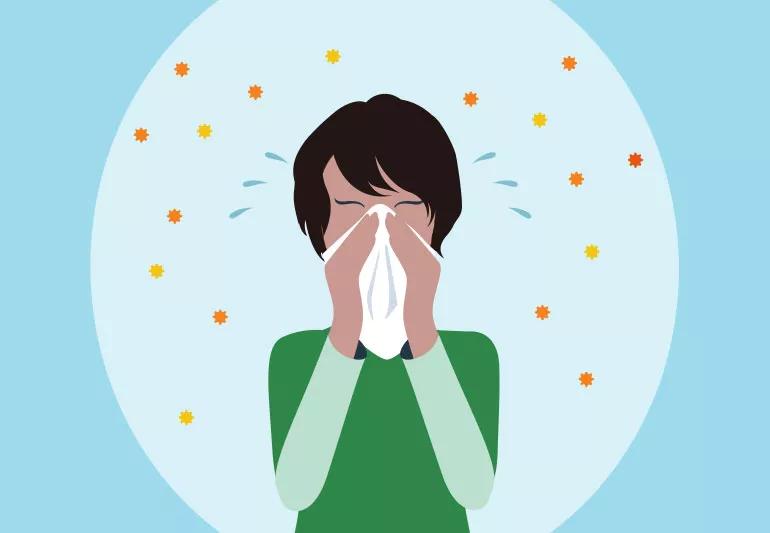Every season comes with its own set of allergens

April showers bring May flowers, but they also signal the beginning of allergy season. When tree and then grass pollen are circulating in the air, our eyes, noses and throats can be afflicted with symptoms.
Advertisement
Cleveland Clinic is a non-profit academic medical center. Advertising on our site helps support our mission. We do not endorse non-Cleveland Clinic products or services. Policy
But spring and summer aren’t the only time of year when seasonal allergies run rampant. Depending on where you live in the world, what’s airborne around you and the health of your immune system, you can experience seasonal allergy symptoms in the fall and winter months, too.
Allergist-immunologist David M. Lang, MD, explains when allergy seasons peak and how best to manage your symptoms when allergies strike.
You can think of your immune system like an internal sheet of armor. It’s a full-body network of organs, white blood cells, proteins and chemicals that work to protect your body from germs and other foreign invaders. But sometimes, your immune system can be overprotective by identifying harmless substances like pollen, dust mites, mold and pet dander as foreign invaders it needs to fight off — this can result in seasonal allergies.
Different allergens peak during different seasons:
Advertisement
Weather can have a huge impact on the presence of allergens and cause them to peak earlier or later than expected. A cold, wet spring, for example, can delay tree pollen season and cause it to overlap with the peak of grass pollen season, making a double whammy for allergic reactions.
“Rain washes pollen from the air, so rainy days tend to be days with lower pollen counts,” Dr. Lang explains. “Conversely, warm and breezy summer days typically have higher pollen counts.”
For people who are polysensitized, or allergic to multiple allergens, allergic reactions can happen year-round, providing little to no relief.
“More frequently, we see people with year-round symptoms, and there are peaks in the warmer times of the year,” notes Dr. Lang. “But then, we may find on skin testing they’re sensitized to pollens and molds, as well as dust mites and cat or dog dander.”
Different allergies peak at different times depending on where you live in the world, too, and what might affect someone in one region might not affect anyone the same way in another region. For instance, in California, Bermuda grass is the major pollen allergen that triggers symptoms and ragweed isn’t an issue. In Texas, it’s mountain cedar trees.
“The cedar trees there pollinate early in the year, in January and February, and they can have much higher counts of tree pollen in the air than people might have in the Midwest,” says Dr. Lang.
If you develop a seasonal allergy, you’ll likely experience symptoms around the same time every year. These symptoms will also last as long as allergens remain in the air. This happens because your immune system releases chemical mediators (including histamine) every time it recognizes an allergen as a foreign invader. Histamine increases blood flow to the affected area and triggers inflammation. Histamine causes the all too familiar symptoms of allergic rhinitis (hay fever), which include:
Allergies can make you feel absolutely miserable, but it doesn’t have to always be that way. Dr. Lang recommends a combination of avoidance and medication. Closing the windows of your house (and your car when driving around) and using your air conditioner can greatly reduce the amount of pollen indoors. Medication is also recommended, based on high-quality evidence, to help manage the symptoms of allergic rhinitis, including:
Advertisement
Home remedies are also available, but they may not be as effective as the above therapies. These include a high-efficiency particulate air (HEPA) filter, washing your bedding once a week, taking a hot shower and alternatives like acupuncture.
“If you’re experiencing symptoms that interfere with your desire to pursue activities or your symptoms are interfering with work or school performance, causing sleep disruption or sleep impairment despite avoidance measures and regular medications, you should see an allergist,” Dr. Lang advises. “We frequently see patients who are needlessly not feeling well and we can help.”
Advertisement

Sign up for our Health Essentials emails for expert guidance on nutrition, fitness, sleep, skin care and more.
Learn more about our editorial process.
Advertisement

Most antihistamines, like Zyrtec, are OK, but avoid decongestants for at least the first trimester

You can now get lifesaving epinephrine in a nasal spray and prefilled syringes

Drowsiness is a side effect of inflammation, disrupted sleep and, sometimes, your allergy medicine

If you’re sensitive to aspirin or other salicylates, limiting exposure is the best remedy

Mold exposure can cause allergic reactions, asthma and skin rashes

If allergies have you coughing and sniffling all night, try showering before bed, keeping the windows closed and propping your head up

If allergies make your mornings a slog, consider closing the windows and showering at night

When the trees start to bloom, your allergies can come to life — medications, closing the windows and keeping clean can help

Even small moments of time outdoors can help reduce stress, boost mood and restore a sense of calm

A correct prescription helps your eyes see clearly — but as natural changes occur, you may need stronger or different eyeglasses

Both are medical emergencies, but they are very distinct events with different causes